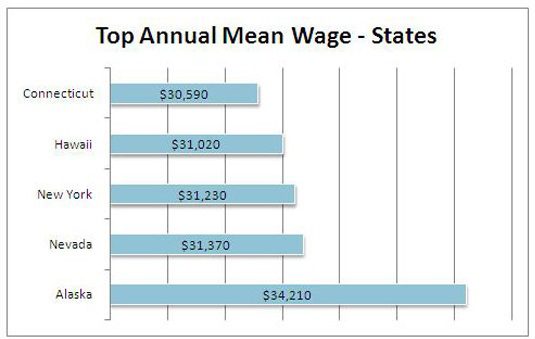Medical billing specialist reviews and verifies medical bills and accounts with accounts receivable and patient ledger. Ensures the accuracy of the recording, tracks, and makes the necessary corrections. The Medical Billing Specialist changes the information system to support an accurate and efficient billing and financial closing process. He also follows proper health and insurance claims procedures. Besides, a medical billing professional usually requires a high school diploma or equivalent.
works under moderate supervision. They are obtaining or achieving full mastery in a specific area of the discipline. Becoming a Medical Accountant typically requires 1-3 years of relevant experience, or it may take 0 years of experience with additional specialized training and certification.
Medical Billing Specialist Salary
Many billing professionals work full-time, although some may work part-time or as contract employees. The salary of billing professionals varies depending on the agreed pay structure, a percentage of fees, a flat rate per collection or annual salary, educational or certification level, and related work experience.
The average salary of a medical billing specialist in the U.S. is $16.18 per hour. Some salaries range from $ 7.25 to $ 29.05 an hour. According to AAPC’s 2019 Salary Survey, medical billers with CPB certification average $55,078 in annual salary.
Job Description and Duties
Detail-oriented people who love math and want to work in the office can find jobs as a billing specialist. Billing specialists, sometimes referred to as invoice or budget clerks, work in the accounts payable and receivable department or the company’s general business department. They calculate the amounts due for goods or services, prepare outgoing invoices, and correct discrepancies. Employers generally require billing professionals to have a high school diploma, and those with specialized training and skills generally receive higher wages.
The billing specialist is the administrator who manages the billing processes, most often for the insurance office or healthcare facility. The billing specialist’s responsibilities include managing medical bills for patients, updating patient information, creating bills, and processing payments. Other responsibilities include the following:
- Submit claims for reimbursement of expenses to public, private, and employer insurance
- Work with self-paying patients to develop payment plans
- Ensure proper documentation and quick payment responses through accurate and timely data entry
- Tracking claims, including cancellations, payments and requests for additional information
- Consult with the families of the patients if necessary.
- Process payments immediately upon receipt and document payment documents and issues as they arise
- Initiate private collection of payments after insurance cancelled, cancelled or other problems
- Investigate and resolve customer billing issues or issues
- Help patients and their families for the application of medical loan programs and other financial solutions
Success in this role requires an in-depth knowledge of billing and health insurance policy software. The ideal candidate must also demonstrate exceptional communication skills, as communicating with patients and insurance agents will be an essential part of the job.
The education, skills and experience of billing professionals can be leveraged across many industries. These professionals can offer their skills to the following:
- Production
- Government
- Education
- Corporations
- Health care
Education, Training and Certifications
Specific requirements may be required to qualify for a Billing Specialist position depending on the level of vacancies you are applying for, including specific education, training, and certification.
Medical Billing Education
Entry-level billing professionals generally need to have a high school diploma or equivalent, skills, certifications, and experience. Some positions prefer at least an associate or bachelor’s degree. Some employers may indicate a preferred field of study to prepare the billing specialist for specific industry challenges. Some of these degree areas may include accounting, health care management, or health information management.
Those without advanced degrees can also earn technical certifications that teach the skills needed to work as a billing professional, including billing software, insurance records, communications, medical terminology, and administration. Some roles can take on a commensurate experience to replace educational requirements.
Medical Billing Training
While technical specifications for the job, such as medical coding, are learned in class, many aspects of the job are learned as the job is done. For example, many billing professionals find it easier to learn the specifics of their office software or accounting practices during the first few weeks of operation. Billing professionals with similar experience can transfer acquired skills, such as customer service and time management, to work for a new employer.
Medical Billing Certifications
Professional certificates can prove a professional’s qualifications in front of current and future employers. Billing professionals can earn certifications to gain more hands-on knowledge of their day-to-day responsibilities, test their professional skills, and pursue a career. Some of the most common certifications for a medical billing specialist are:
- Certified Medical Reimbursement Specialist (CMRS) certification
- Certified Professional Biller (CPB)
- Certified Professional Coder (CPC)
ZEE Medical Billing provides you access to a team of Medical Billing Specialists continuously trained for industry updated like Telehealth, COVID-19 Vaccine CPT Codes, Medicare ABN and avoiding Medical Billing Malpractices.





